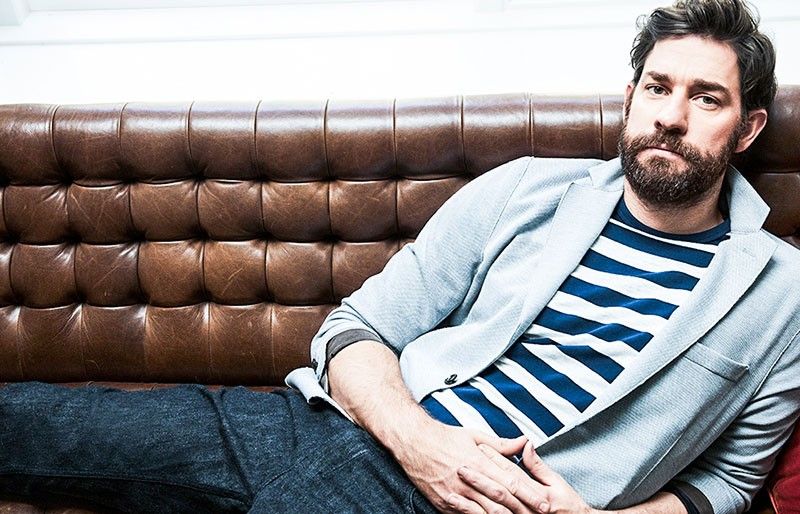Awards buzz is icing on the cake for John Krasinski and ‘A Quiet Place’

John Krasinski is still pinching himself over the critical and financial success of his experimental thriller “A Quiet Place,” but the Cinderella year is not over yet. With awards season heating up, “A Quiet Place,” has found its own spot in the conversation. Krasinski, who co-wrote, directed and starred in the film opposite his wife, Emily Blunt, is only humbled.
“It’s nothing short of overwhelming,” Krasinski said by phone recently. “Emily and I really are still digesting the fact that we made this small little special movie that some people really connected to. This was literally a meditation on parenting!”
“A Quiet Place” is a mostly silent horror film about a family (Krasinski, Blunt, Noah Jupe and Millicent Simmonds) trying to live among creatures that attack and kill at the smallest sound. It became a surprise box-office phenomenon when it was released in April, grossing $338.6 million in worldwide ticket sales off a production budget of only $17 million. It is now available on home video and streaming, and a sequel is already in the works.
Critics loved its high concept thrills, too, and while many have offered their praise, a certain phone call stands out for Krasinski — the one he got from his favorite director, and friend, Paul Thomas Anderson.
“It was probably 30 minutes long about how much he loved the movie and how much it meant to him and how much he wished movies like this happened every Friday. I genuinely blacked out on that phone call,” Krasinski said. “He said, ‘I’ll tell you the best compliment I can give you: As I was walking back to my car I thought, OK, I need to get back to work.’”
Anderson actually provided some inspiration for “A Quiet Place.” Krasinski said he studied the opening of “There Will Be Blood” and other modern films that employ silence to figure out how he would approach it in his film. He also looked at “Jaws,” “Rosemary’s Baby” – the films of Alfred Hitchcock – for ideas in tension-building.
“Jaws” was one of Krasinskis biggest touchstones, and, oddly enough, the first movie he and Blunt watched together when they had just started dating.
“It’s a perfect film,” he said. “It’s not about a shark, it’s about these characters trying to overcome fears that they’re running away from and at some point those fears are going to manifest themselves in the most bizarre ways.”
In that same way, “A Quiet Place,” to him, is about parenting. He had been sent a script to look at and had an idea to re-write and refocus around those anxieties.
“I was actually holding my three-week-old daughter. We had just had our second daughter,” he said. “Reading a story about parents doing whatever it took to protect their kids was exactly what I was living through.”
Krasinski wasn’t even supposed to direct the film at the outset. The actor and writer, probably best known as Jim on the American version of “The Office,” had previously directed two films — a David Foster Wallace adaptation (“Brief Interviews with Hideous Men”) and an indie family drama (“The Hollars”). Not exactly the kind of calling cards that would prove he could handle a VFX-heavy, big studio genre film. It was Blunt who encouraged him to put his name in for it.
“She said, ‘I’ve never seen you so lit up like this, I’ve never seen you so passionate about something,’” Krasinski recalled. “And it’s true, she knew that it was a very personal story. I was basically writing a love letter to my kids.”
And to his shock, executives at Paramount and Platinum Dunes were behind him.
Blunt also was the driving force behind her own involvement. Krasinski was too scared to even let her read the script while he was working on it, let alone ask her to be in it. She went so far as to suggest a friend for the role of Evelyn. But then on one cross country flight, she finally read it, and decided to speak up.
“She legitimately looked sick at the end of it. I thought she was plane sick, so I reached for a barf bag at the same time she said, ‘You can’t let anyone do this movie.’ And I said, ‘What?’ And it was like a romantic comedy where she was proposing to me,” Krasinski recalled. “She said, ‘You have to let me do this part, you HAVE to let me do it.’ I think I screamed ‘YES’ on a flight from New York to LA.”
The film has been in the Oscar conversation since it came out and has continued to pop up on prognosticator lists in Hollywood trades like Variety and awards columns in Vulture and Gold Derby, with special mentions of Blunt’s performance, the effects and the screenplay.[PHOTO CAPTION] Rami Malek stars as Queen lead singer Freddie Mercury in a biopic tracing the British rock quartet’s first 15 years.
‘Bohemian Rhapsody’ won’t rock you, but Malek will
Where does a preening, pansexual rock god get his powers? The Freddie Mercury biopic “Bohemian Rhapsody” traces his sonorous majesty to an unlikely place: his back teeth.
Mercury, nee Farrokh Bulsara, was born with four extra incisors, giving him a bigger mouth. Introducing himself to his future Queen bandmates Mercury, as played by Rami Malek, explains that the added chompers have benefits beyond a provocative, pronounced overbite. It endows him with enhanced vocal range.
Teeth-assisted or not, Mercury’s voice was so expansive that it prompted genuine scientific inquiry. But range is one thing sorely lacking in Bryan Singer’s “Bohemian Rhapsody,” a slavishly conventional rock biopic that at every turn opts for the stereotypical despite a subject who devoted himself to the unconventional. It’s a remarkably bland movie about a deliciously vibrant performer.
Yet while “Bohemian Rhapsody” is so hollowly, even comically formulaic that even Dewey Cox of “Walk Hard” might snicker, it’s filled, often fantastically, by Malek’s sinuous, fully inhabited performance as the Queen frontman. It’s as if he didn’t get the note about the half-hearted filmmaking going on around him, or if he did, he’s hell-bent on ignoring it.
Malek, the “Mr. Robot” actor, throws himself into every strutting second of screen time as Mercury. He lacks both Mercury’s voice (it was overdubbed for singing and performance scenes) and Mercury’s teeth (Malek was outfitted with fake ones). But Malek’s performance, especially on stage, is so full-bodied that he transcends both his own differences with Mercury and the tepid surrounding melodrama.
That “Bohemian Rhapsody” is a bit of a mess isn’t altogether a surprise. Singer was fired toward the end of shooting for not showing up on set (Singer said it was to visit an ill parent) and was replaced by Dexter Fletcher. Singer remains the credited director; Fletcher is listed as a producer.
The script, too, underwent several passes before one by Anthony McCarten (“Darkest Hour,” “The Theory of Everything”) ultimately prevailed. The film opens moments before Queen’s Live Aid performance at Wembley Stadium in 1985, and — as if by rock biopic decree — shifts back in time to young Freddie, in his mid-20s and living with his parents in the London suburbs.
Mercury was born to a Parsi family from Zanzibar (he attended boarding school in India), but we get only the slightest of hints of his family heritage or what made Mercury run from it. By the time we meet him, he hasn’t yet adopted his Roman god moniker (more than a stage name, he made “Mercury” legal), but he might as well have. Young Freddie is already a larger-than-life figure clearly destined to a life of skin-tight jumpsuits and glam-rock anthems. In a flash he goes from slinging luggage on the Heathrow tarmac to convincing guitarist Brian May (Gwilym Lee) and drummer Roger Taylor (Ben Hardy) that he’s their new lead singer.
Everything in “Bohemian Rhapsody” happens less with the thrust of life than the rapid-fire recounting of a biographical history, sometimes rigorously in step with Wikipedia, sometimes taking shortcuts to avoid anything that strays outside a neatly contrived narrative.
In the span of minutes, Queen is a sensation with a record contract (Mike Meyers joins for a tongue-in-cheek cameo as EMI executive Ray Foster) and aspirations for much more: a world tour, a far-out concept album and beyond. Our sense is that Mercury has swiftly — and with curiously little trouble — realized his true self, in all his peacocking glory.
The conflict, hinted at in passing glances in between recording sessions, is that Mercury, who died of AIDS-related pneumonia in 1991 at 45, isn’t quite so free off stage as he is on, despite all his radical flamboyance. Much time is spent with his longtime partner Mary Austin (Lucy Boyton) and, later, with a diabolical personal manager-boyfriend, Paul Prenter (Allen Leech), who gets most of the blame for anything bad Mercury ever did.
But the film mostly sticks to the familiar trajectory of rock stardom: studio magic, backstage excess, band infighting, misguided solo efforts, drug problems and — that most heinous of menaces in the music biopic — the temptation of disco.
The only time “Bohemian Rhapsody” works is when it finally retreats from not just the standard biopic narrative but from storytelling altogether. It concludes with a nearly song-by-song recreation of the band’s reunion show at Live Aid which, despite the movie’s fudged timeline, took place two years before Mercury’s AIDS diagnosis. Still, the power comes mainly from the tunes and from Mercury/Malek’s magnificent stage presence. “Bohemian Rhapsody” might be easy come, easy go, but Malek makes for a show-stopping silhouetto of a man.
- Latest
























